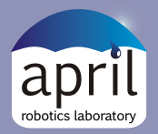
Large position errors plague GNSS-based sensors (e.g., GPS) due to poor satellite configuration and multipath effects, resulting in frequent outliers. Due to quadratic cost functions when optimizing SLAM via nonlinear least square methods, a single such outlier can cause severe map distortions. Following in the footsteps of recent improvements in the robustness of SLAM optimization process, this work presents a framework for improving sensor noise characterizations by combining a machine learning approach with max-mixture error models. By using max-mixtures, the sensor's noise distribution can be modeled to a desired accuracy, with robustness to outliers. We apply the framework to the task of accurately modeling the uncertainties of consumer-grade GPS sensors. Our method estimates the observation covariances using only weighted feature vectors and a single max operator, learning parameters off-line for efficient on-line calculation.
@inproceedings{morton2013iros,
TITLE = {Robust Sensor Characterization via Max-Mixture Models: {GPS}
Sensors},
AUTHOR = {Ryan Morton and Edwin Olson},
BOOKTITLE = {Proceedings of the {IEEE/RSJ} International Conference on Intelligent
Robots and Systems {(IROS)}},
YEAR = {2013},
MONTH = {November},
KEYWORDS = {sensor characterization, max-mixtures, GPS},
}